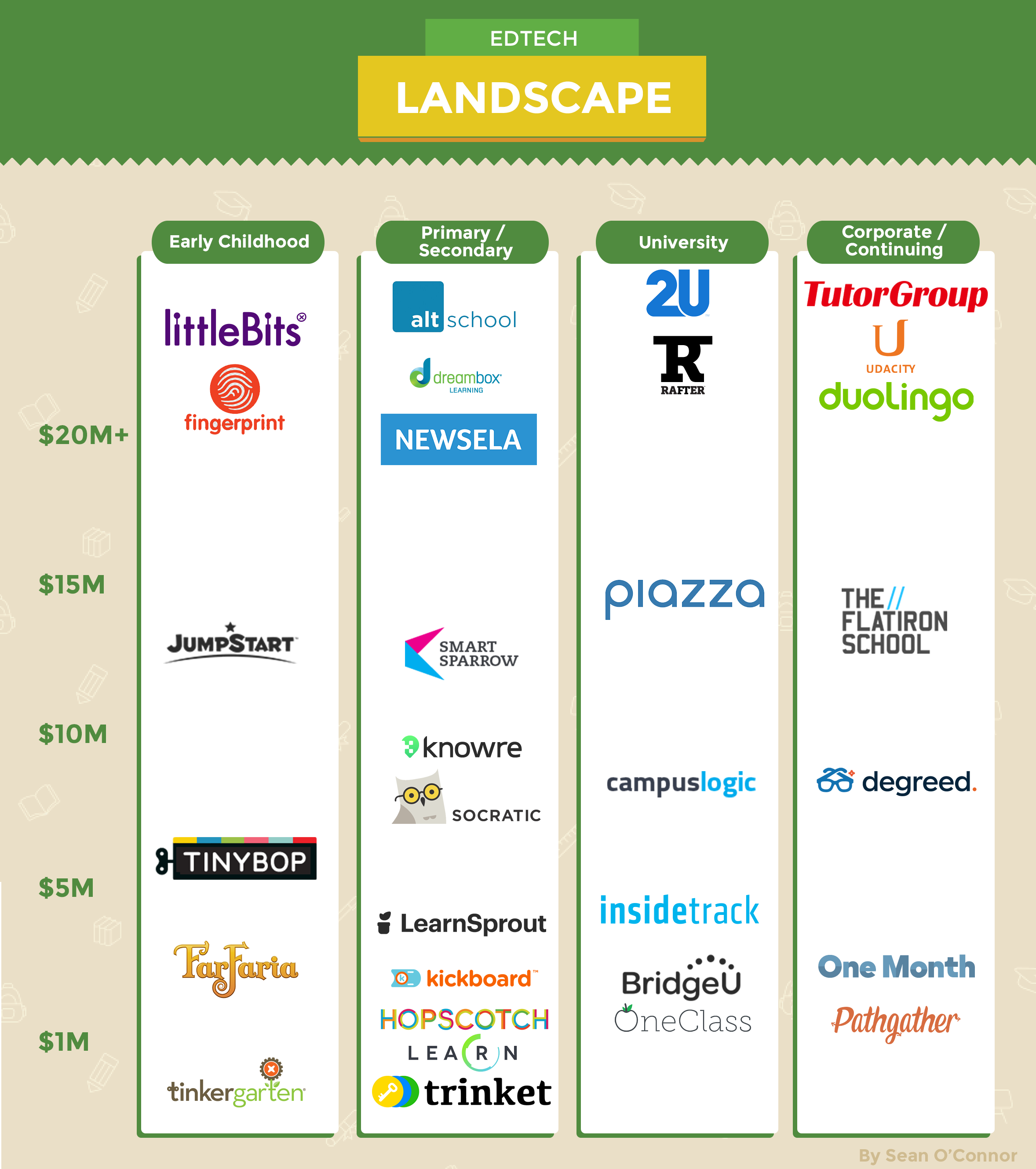There are only 11 education-focused firms listed on the U.S. stock market with a market cap of over $1 billion. While the market is small and fractured today, GSV Capital estimates that education will grow from 9 percent to 12 percent of America’s GDP over the next decade. This equates to a trillion-dollar opportunity.

Early childhood
- FarFaria: FarFaria is a literacy tool that offers families a vast library of books that are perfect for story time. Parents can go through the books with their son or daughter, or children can have the books read to them by the app.
- Tinybop: Tinybop creates iOS apps that engage children and promote curiosity in kids. Their apps break down complex subjects (like geology and anatomy) into engaging apps that are filled with stunning illustrations.
- Vroom: Vroom is a new app that pushes helpful tips to parents on how to turn everyday moments in life into brain-building opportunities. Vroom sends parents actionable tips and strategies that are age-appropriate for their child.
- Tinkergarten: Tinkergarten helps kids develop and grow through outdoor-play-based learning and activities. They have a technology-enabled, distributed workforce that allows them to expand their classes across the United States.
Primary/secondary school
+++++++++++++++++++++
My Note:
“although 95 percent of schools have Internet, only 20 percent have high-speed access. For technology to disrupt our schools, we need to get them connected.”
yet, MN government is right now quarreling about fast-connection networking rural parts of Minnesota, whereas the Republicans insist on $30 Mil only, Democrats on $80Mil and the governor on $100K+.
In 2002, the U.S. created the conditions for monopoly in the Internet services providers market, which accumulates to disastrous results. The fight around net neutrality proves one more time that trend (of monopolizing connectivity and profiteering for big companies, rather then developing the US):
http://www.npr.org/sections/alltechconsidered/2014/02/06/272480919/when-it-comes-to-high-speed-internet-u-s-falling-way-behind
++++++++++++++++++++++
Trend: One of the major developments in primary and secondary education is the focus on personalization. Students get pushed material that meets them where they are, when they need it. Classes can now adapt to a learner’s needs and provide them with the skills, the instruction and the resources they need to master concepts.
- AltSchool: AltSchool was started in 2013 and is rethinking the way school works. Their technology platform enables teachers to create weekly “learning playlists” for each student. They’ve done away with formal classes and focus on group projects and individualized instruction.
- CK-12: The CK-12 Foundation serves tens of thousands of schools and millions of students by providing free customizable learning tools and content. Students can use their interactive simulations and adaptive problem sets and teachers can customize their flexbooks.
- DreamBox: DreamBox powers more than 5 million math lessons every week through their adaptive K-8 math platform. The platform continually assesses a student’s strengths and weaknesses to close gaps and meet students with the right material at the right time.
- Trinket: Trinket lets teachers and students write, run and share code from any device. Trinkets can be easily adapted to the classroom and shared with students to run real-time coding challenges.
University
College is expensive in America; the average cost is more than $20,000 a year for a four-year degree. At least 65 percent of the 55 million new jobs forecasted for the next decade will require a formal post-secondary credential.
In 2015, only 50 percent of college graduates were working in the field they studied, and more than one-third indicated they would have chosen a different major. Nearly 40 percent of college graduates believed their school did not prepare them well for employment.
Students are going to university because it is “the right thing to do,” often without a thought to the ROI on their education or the work opportunities after school. Only 19 percent of full-time college students graduate in four years, which dramatically increases the cost of their degree.
Trend: Online platforms are being leveraged at universities to help drive down the cost of a degree and increase access to programs. Big data platforms are being used to identify students in danger of failing and provide targeted assistance to help them graduate on time.
- Rafter: Rafter is redesigning textbooks at universities by repackaging course materials. They’ve helped almost 3 million students save more than $700 million on textbooks.
- 2U: 2U offers schools as a service by providing universities with a platform to create online degree programs. They have more than 500 faculty, 1,000 course sections and 1,600 hours of live instruction per week.
Corporate/continuing education
Trends: The two largest sectors for investment are skill training (primarily coding and digital literacy) and English language learning.
- Degreed: Degreed provides a personal knowledge portfolio that stays with learners. They’ve cataloged 250,000+ online learning courses and 3 million-plus informal learning activities. They also help large companies understand the talent and skills within their organization.
- Duolingo: Duolingo is a gamified language learning app that has more than 100 million users. They offer free instruction and are helping non-native English speakers certify their skills with affordable online testing.
- Pathgather: Pathgather is an enterprise LMS that motivates employees to learn and connect around professional development.
- iTutorGroup: iTutorGroup is a Chinese-based English language platform that began by offering English language training to corporate executives and has expanded to offer online courses for children and younger learners. They recently raised a Series C valuing them at more than $1 billion.
- One Month: One Month offers technical-skills crash courses designed to give learners functional skills in 15 minutes a day for one month. Since starting, they’ve helped more than 25,000 students develop foundational technical skills.
- altMBA: altMBA is an intensive, four-week online workshop designed by Seth Godin for high-performing individuals who want to level up and lead. They are rethinking the structure of learning online and have seen a 98 percent completion rate for their program.

